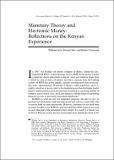Monetary Theory and Electronic Money: Reflections on the Kenyan Experience
Author(s)
Jack, William; Suri, Tavneet; Townsend, Robert
DownloadTownsend_Monetary theory.pdf (270.7Kb)
PUBLISHER_POLICY
Publisher Policy
Article is made available in accordance with the publisher's policy and may be subject to US copyright law. Please refer to the publisher's site for terms of use.
Terms of use
Metadata
Show full item recordAbstract
This article uses a class of models of money and the payments system to inform an analysis of "mobile banking" in the context of the rapid expansion of M-PESA, a new technology in Kenya that allows payments via mobile phones (even without any access to a bank account), and currently reaches close to 38 percent of Kenyan adults. The separation of households and firms in space and time suggests, in theory, from various separate models, a number of implications. These include (i) the potential gain, under some circumstances, from allowing net e-money credit creation, (ii) the impact that the associated enhancement of credit markets can have on monetary policy and on the real economy, (iii) the roles that e-money could play not only in credit but also in insurance, unrelated to its payment function, (iv) the potential role for an activist monetary policy and e-money management, (v) the role of e-money as a circulating private debt and as a store of value though with potential coordination problems associated with achieving balanced security transformation, (vi) the potential welfare losses from insisting on continuous net clearing of cash and e-money and the difficulty, in any event, of achieving this in practice, and (vii) the management of shortages in the context of fixed rates of exchange of e-money for cash. We provide some summary statistics from data collected on M-PESA agents and users that are reminiscent of the environments of the models and that support some of these implications. Other implications of the models suggest reforms to enhance the system's efficiency.
Date issued
2010-01Department
Massachusetts Institute of Technology. Department of Economics; Sloan School of ManagementJournal
Economic Quarterly
Publisher
Federal Reserve Bank of Richmond
Citation
Jack, William, Tavneet Suri, and Robert Townsend. "Monetary Theory and Electronic Money: Reflections on the Kenyan Experience." Economic Quarterly 96.1 (First Quarter 2010) pp. 83–122.
Version: Final published version
ISSN
1069-7225